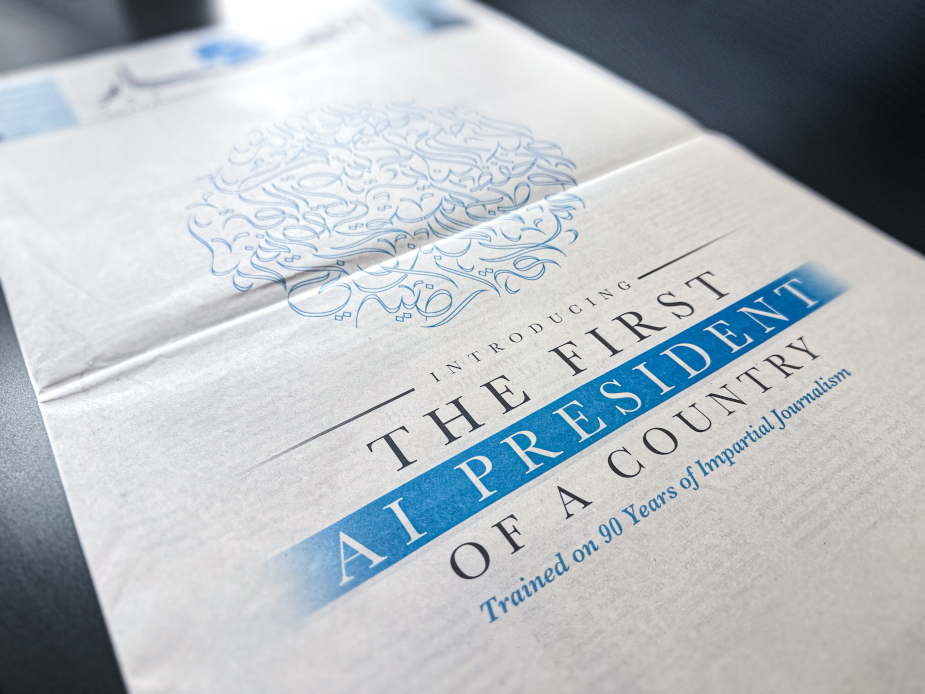
How Impact BBDO Built Lebanon an AI President Using AnNahar's Journalism Legacy

In a groundbreaking move that merges technology with governance, Lebanon has introduced the world's first artificial intelligence designed to perform presidential duties. This innovative campaign, spearheaded by the newspaper AnNahar in collaboration with Impact BBDO Dubai and Addition New York, aims to address Lebanon's prolonged political stalemate, where the country has been without a sitting president for over two years.
Launched on April 9th, the AI president was unveiled in a live broadcast by AnNahar's editor-in-chief, Nayla Tueni. The AI leverages 90 years of impartial journalism from AnNahar to provide unbiased answers and solutions to Lebanon's political, legal, and governmental questions. By tapping into this extensive knowledge base, the AI president offers a unique blend of historical insight and modern data analysis.
LBB's Alex Reeves speaks with the team from Impact BBDO – Ali Rez, chief creative officer for the MENAP region, Joe Abou Khaled, regional ECD, Johannes DeBeer, Dubai ECD, and Emile Tabanji, Beirut CEO – to delve into the creation and implications of this pioneering project.

LBB> Can you explain why Lebanon has been without a president for over two years to people around the world?
Joe> Lebanon’s politics are famously characterised by a corrupt, sectarian structure, as well as by constant interference from neighbouring states, making consensus amongst our politicians an almost-impossible idea. That is why despite meeting for 13 parliamentary sessions, our politicians have repeatedly failed to set aside their differences and elect a president, leaving the country in a leadership vacuum of over two years.
LBB> Why is an AI president the right idea for AnNahar?
Hannes> AnNahar has been reporting about Lebanon since the 1930s, and the means of delivering journalism haven’t changed much since its inception – it’s still basically written and spoken word. This was a way to not only showcase the power and utility of impartial journalism, but also a way to evolve the medium through a powerful message packaged in an interactive solution.
LBB> When did you realise that this idea was actually something serious that could work? Was there a breakthrough moment?
Ali> The breakthrough moment was when we realised two things. The first was that AnNahar arguably has collected the most comprehensive and impartial knowledge of Lebanon in the world, with almost a century worth of objective daily journalism. The second point was realising the value that data brings to the world currently, as we stand on the precipice of the AI revolution.
LBB> We could all put the same prompts into a more general AI. Can you demonstrate some ways in which tutoring the AI President on AnNahar's journalism has made it more appropriate than ChatGPT or something more generic?
Hannes> ChatGPT does not have one specific purpose, and was trained on a very wide range of data sets. Being fed such a various array of data inputs can arguably end up making ChatGPT biassed in the information it offers users. The AI president on the other hand, was built with one purpose in mind, to act like the leader that Lebanon deserves by being enriched with locally-specific historical context and impartial journalism from the last century. This would mean that its output is incapable of being biassed, but rather only offers data-driven solutions.
LBB> How does it work?
Hannes> It has an interface similar to ChatGPT where users input a prompt, in this case ‘how might Lebanon’ and then type in a question about the future or current state of the country’s affairs. The AI program then goes over key historical events and other important context from its vast database of over 90 years, and the algorithm does its thing in connecting the dots and analysing the information. Then it offers its tailored and fact-based solutions.
LBB> What were the most important challenges to overcome in the process of building the AI?
Emile> Definitely enriching the model with all of the data. Not only were there loads of legalities to consider, seeing as pulling out a 90-year archive from a reputable newspaper is no easy feat and had us involved with a lot of lawyers, the actual process of teaching the AI was also very long. It took us around four months, including an extensive period of trial and error with the program, before we made it accessible to the Lebanese public.
LBB> How is this AI helping the people of Lebanon?
Joe> For so long the people of Lebanon have been screaming into a political void – their demands and questions have not been met with satisfying responses, because there’s no one there to even hear them! We wanted a political figure that was one for the people, someone accessible, transparent and always objective. We wanted to democratise the idea of a leader into one that should be a tool and a voice for the people who elect it.
LBB> And has it been well received by AnNahar as a news organisation?
Ali> AnNahar is an acclaimed news source in Lebanon, known for its long history and objective and reputable reporting, so yes the public reaction has been overwhelmingly positive for the most part. Since people know the AI was fed by independent journalism, it created a sort of trust for its impartial opinions.













